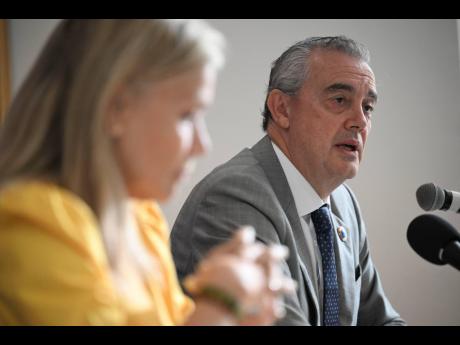EU nations to invest in renewable energy in Ja
A European Union (EU) delegation is currently in Jamaica and looking to develop partnerships with Jamaican companies in the renewable energy sector to assist the country in meeting its 50 per cent target for renewables by 2030 in a remix of the energy grid.
The delegation is also formulating a framework to facilitate investments by EU countries in the country’s digital transition as well as the transformation of Kingston Harbour into a sustainable logistics hub.
Félix Fernández-Shaw, director for Latin America the Caribbean and relations with all Overseas Countries and Territories at the European Commission’s Directorate-General for International Partnerships, who heads the three-day investment mission, said collaboration with Jamaican companies in the renewable energy sector was a key strategy to ensure that the investments made by European countries are successful.
“Most of the companies that want to invest need a strong Jamaican partner and a strong Jamaican educated workforce that can work with a number of technical aspects, and that’s where I think the whole premise of the investment comes together,” he said.
Fernández-Shaw was speaking with journalists during a media briefing yesterday.
HIGH-LEVEL DISCUSSIONS
The delegation, which arrived on the island on Wednesday, has been engaging in high-level discussions with government officials, financial institutions, European businesses, and other stakeholders to attract public and private investments.
According to Fernández-Shaw, the interest in investment in Jamaica’s green economy is “not about bringing a whole set of European companies here to work on renewables”, but stressed he that the training of Jamaican workers will also be fundamental.
“And that is why we need the partners, and that is why we need to have a trained workforce in renewable energies, in digitisation. These are the future jobs and therefore it is important that we work with companies in how trainings are to be done and vocational training for young people so that they can specialise,” he said.
In September last year, the Government invited bids from investors for the provision of an additional 100 megawatts of renewable energy capacity. The requests for proposals have been issued through the Generation Procurement Entity (GPE).
The investors being sought will be required to build, own, and operate the new renewables power-generating plants. GPE will allow bids for one energy source or hybrid combinations.
Most of Jamaica’s energy is generated from liquefied natural gas and oil, which make up 88 per cent of the energy grid. Renewables account for the other 12 per cent.
DEADLINE FOR PROPOSALS
The proposals, due by February 1, 2024, may or may not include storage – which are batteries that hold the power generated during peak periods for use during low periods such as at night for solar.
By April this year, Fernández-Shaw said proposals from European companies seeking to invest in Jamaica should be presented to the Government for consideration. He is optimistic that partnership announcements will be published subsequent to that.
In the meantime, stating that much more could be done at the Kingston Harbour to improve its efficiency, he also outlined the delegation’s plan to explore potential infrastructural investments at the Port of Kingston.
“What we’re trying to do is convene a number of people around a couple of projects around the harbour, projects that are related to harbour efficiency, but also water management and nature management,” he said.
Importantly, however, he noted that the Kingston Harbour’s development should include giving consideration to the effects of the green economy.
“In the next 15 years, Europe is going to say everything that comes to Europe needs to be green, therefore the ships bringing stuff to Europe need to be green. They need to be green power. So we’re working on how to shift from diesel to green hydrogen, for instance, or other types of fuel,” he said.
“Now, if the Kingston Harbour has a green hydrogen capacity or green fuel or sustainable fuel capacity, or it doesn’t, it will determine whether it will become a value-chain stop for Brussels or for Europe. And if you have it and other islands in the Caribbean don’t have it, you are ahead, and vice versa,” he added.
Engagements with the Jamaica Stock Exchange to explore a strategic partnership for the issuance of a green bond, an intiative that is to yield substantial involvement from European investors upon its issuance, is also on the delegation’s agenda.
So, too, are discussions with the Development Bank of Jamaica and the National Water Commission to determine how to spearhead climate-change initiatives focused on energy and water sanitation.
“It’s not only about ... producing renewable energy. It’s also about having the necessary market incentives so that production energy is accessible to all the people,” Fernández-Shaw said.

